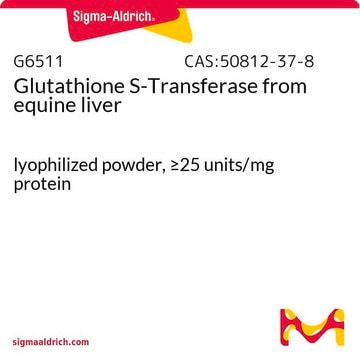GS70
GST P1-1, Recombinant Human
Synonym(e):
DFN7, FAEES3, GST3, GSTP, HEL-S-22, glutathione S-transferase pi
About This Item
Empfohlene Produkte
Biologische Quelle
human
Qualitätsniveau
Rekombinant
expressed in E. coli
Assay
>95% (SDS-PAGE)
Form
frozen liquid
Spezifische Aktivität
60.45 units/mg protein
Mol-Gew.
23 kDa
Lagertemp.
−70°C
Angaben zum Gen
human ... GSTP1(2950)
Allgemeine Beschreibung
Biochem./physiol. Wirkung
Lagerung und Haltbarkeit
Lagerklassenschlüssel
10 - Combustible liquids
WGK
WGK 1
Flammpunkt (°F)
Not applicable
Flammpunkt (°C)
Not applicable
Analysenzertifikate (COA)
Suchen Sie nach Analysenzertifikate (COA), indem Sie die Lot-/Chargennummer des Produkts eingeben. Lot- und Chargennummern sind auf dem Produktetikett hinter den Wörtern ‘Lot’ oder ‘Batch’ (Lot oder Charge) zu finden.
Besitzen Sie dieses Produkt bereits?
In der Dokumentenbibliothek finden Sie die Dokumentation zu den Produkten, die Sie kürzlich erworben haben.
Kunden haben sich ebenfalls angesehen
Unser Team von Wissenschaftlern verfügt über Erfahrung in allen Forschungsbereichen einschließlich Life Science, Materialwissenschaften, chemischer Synthese, Chromatographie, Analytik und vielen mehr..
Setzen Sie sich mit dem technischen Dienst in Verbindung.








